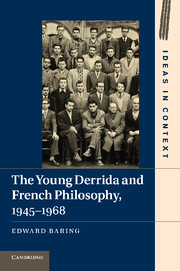Book contents
- Frontmatter
- Contents
- Acknowledgments
- A note on translations and reproductions
- Introduction
- Part I Derrida post-existentialist
- Chapter 1 Humanist pretensions
- Chapter 2 Derrida's “Christian” existentialism
- Chapter 3 Normalization
- Chapter 4 Genesis as a problem
- Chapter 5 The God of mathematics
- Part II Between phenomenology and structuralism
- Epilogue
- Bibliography
- Index
- References
Chapter 1 - Humanist pretensions
Catholics, communists, and Sartre's struggle for existentialism in postwar France
from Part I - Derrida post-existentialist
Published online by Cambridge University Press: 05 November 2011
- Frontmatter
- Contents
- Acknowledgments
- A note on translations and reproductions
- Introduction
- Part I Derrida post-existentialist
- Chapter 1 Humanist pretensions
- Chapter 2 Derrida's “Christian” existentialism
- Chapter 3 Normalization
- Chapter 4 Genesis as a problem
- Chapter 5 The God of mathematics
- Part II Between phenomenology and structuralism
- Epilogue
- Bibliography
- Index
- References
Summary
Nowadays, everybody is a humanist…If Marxists can claim [se prétendre] to be humanists, then followers of the various religions – Christians, Hindus, and many others – can also claim to be humanists, as do the existentialists in turn.
Pierre Naville, discussion in Existentialism Is a Humanism.When Sartre declared that existentialism was a humanism in front of the tightly packed crowd at the Salle des Centraux, it was a brilliant tactical move. In the year leading up to his lecture, Sartre's writings had been subject to numerous and sometimes conflicting criticisms from right and left. Derided as a decadent bourgeois philosophy or vilified as the modish immorality of secular youth, “existentialism” had become a pawn in a chess game whose stakes were national and political. But in the talk he gave that night, Sartre regained the initiative and emerged in the political sphere as an active and determined participant.
It was a new direction for Sartre, whose philosophical work from the 1930s had focused on rather technical points of phenomenology – even the social analyses of Being and Nothingness (1943) had outlined no explicit political agenda. Existentialism Is a Humanism broke new ground by bringing Sartre's thought into direct communication with broader themes and questions of postwar political discourse. Venturing into new territory, Sartre did not have the luxury of importing his own terms or recreating the debate; he inscribed existentialism into a field with its own vocabulary, set-piece arguments, and rhetorical moves. His intervention was strategic, exploiting the hasty alliances and barely hidden antagonisms already at work in liberation politics.
- Type
- Chapter
- Information
- The Young Derrida and French Philosophy, 1945–1968 , pp. 21 - 47Publisher: Cambridge University PressPrint publication year: 2011

